虚拟语气句型 6 (含蓄虚拟条件句)例句
otherwise 含蓄条件句的虚拟语气
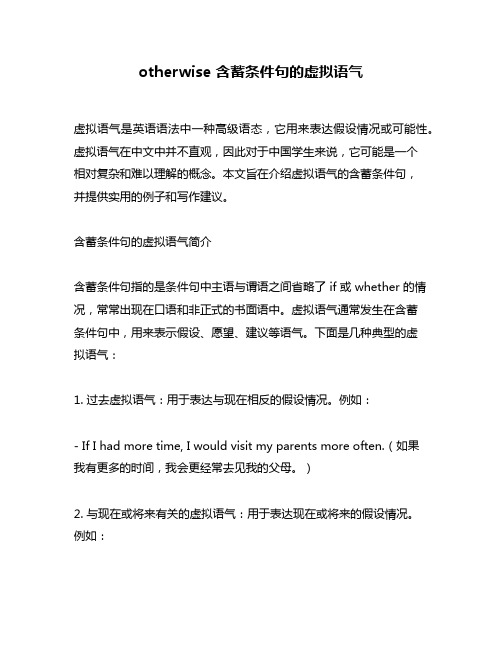
otherwise 含蓄条件句的虚拟语气虚拟语气是英语语法中一种高级语态,它用来表达假设情况或可能性。
虚拟语气在中文中并不直观,因此对于中国学生来说,它可能是一个相对复杂和难以理解的概念。
本文旨在介绍虚拟语气的含蓄条件句,并提供实用的例子和写作建议。
含蓄条件句的虚拟语气简介含蓄条件句指的是条件句中主语与谓语之间省略了 if 或 whether 的情况,常常出现在口语和非正式的书面语中。
虚拟语气通常发生在含蓄条件句中,用来表示假设、愿望、建议等语气。
下面是几种典型的虚拟语气:1. 过去虚拟语气:用于表达与现在相反的假设情况。
例如:- If I had more time, I would visit my parents more often.(如果我有更多的时间,我会更经常去见我的父母。
)2. 与现在或将来有关的虚拟语气:用于表达现在或将来的假设情况。
例如:- If it rains tomorrow, we will not go to the park.(如果明天下雨,我们将不去公园。
)- If I were you, I would not take that job.(如果我是你,我不会接受那份工作。
)含蓄条件句的虚拟语气常常出现在日常交流中,比如情感表达、建议或反驳等。
理解虚拟语气并能够使用它们来表达自己的想法和观点是英语学习的重要方面。
虚拟语气的例子与写作建议为了帮助学生更好地理解虚拟语气,以下是一些实际的例子:1. 假设一位同学想毕业后出国留学,但他可能无法承担高昂的费用。
他可以这样表达他的愿望:- If I had enough money, I would study abroad after graduation.(如果我有足够的钱,我会毕业后去国外留学。
)这个句子中,使用了过去虚拟语气,表达了学生特殊的愿望,即可以毕业后去国外留学,但他没有足够的钱来支付这笔费用。
2. 假设一位上司想建议员工在几个项目中选择一个,他可以这样说:- If I were you, I would choose the third project.(如果我是你,我会选择第三个项目。
虚拟语气用法总结及详细解析
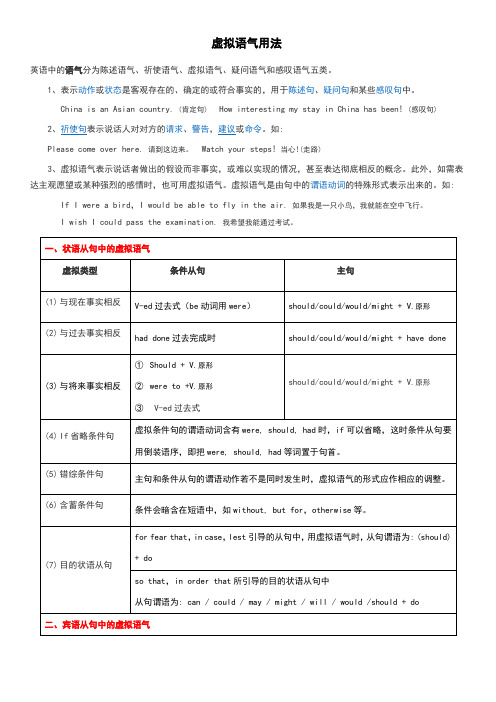
虚拟语气用法英语中的语气分为陈述语气、祈使语气、虚拟语气、疑问语气和感叹语气五类。
1、表示动作或状态是客观存在的、确定的或符合事实的,用于陈述句、疑问句和某些感叹句中。
China is an Asian country. (肯定句) How interesting my stay in China has been! (感叹句)2、祈使句表示说话人对对方的请求、警告,建议或命令。
如:Please come over here. 请到这边来。
Watch your steps! 当心!(走路)3、虚拟语气表示说话者做出的假设而非事实,或难以实现的情况,甚至表达彻底相反的概念。
此外,如需表达主观愿望或某种强烈的感情时,也可用虚拟语气。
虚拟语气是由句中的谓语动词的特殊形式表示出来的。
如: If I were a bird,I would be able to fly in the air. 如果我是一只小鸟,我就能在空中飞行。
I wish I could pass the examination. 我希望我能通过考试。
If there were a heavy snow next Sunday, we would not go skating. 如果下周日下大雪,我们就不能去滑冰了。
If she were to be here next Monday, I would tell her about the matter.如果她下周一来这儿的话,我就会告诉她这件事的始末。
4、有时,虚拟条件句中,结果主句和条件从句的谓语动作若不是同时发生时,虚拟语气的形式应作相应的调整。
这种条件句叫错综条件句。
①从句的动作与过去事实相反,而主句的动作与现在或现在正在发生的事实不符。
If I had worked hard at school, I would be an engineer, too.如果我在学校学习刻苦的话,我现在也会成为一个工程师了If they had informed us, we would not come here now. 如果他们通知过我们的话,我们现在就不会来这里了。
虚拟语气十大句型
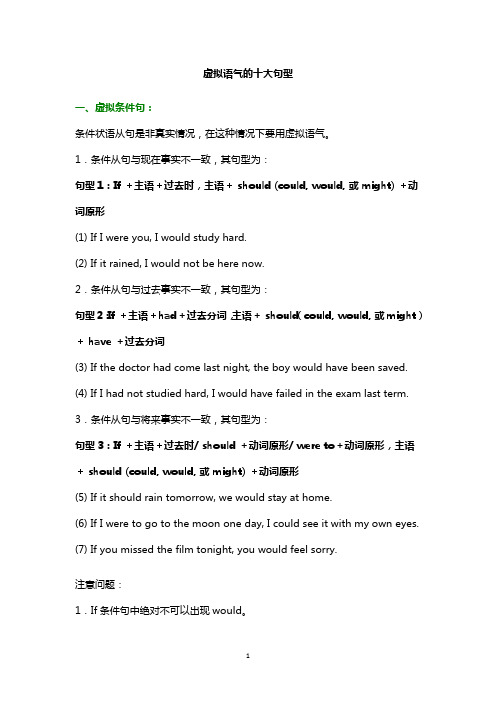
虚拟语气的十大句型一、虚拟条件句:条件状语从句是非真实情况,在这种情况下要用虚拟语气。
1.条件从句与现在事实不一致,其句型为:句型1:If +主语+过去时,主语+ should (could, would, 或might) +动词原形(1) If I were you, I would study hard.(2) If it rained, I would not be here now.2.条件从句与过去事实不一致,其句型为:句型2:If +主语+had+过去分词,主语+ should(could, would, 或might)+ have +过去分词(3) If the doctor had come last night, the boy would have been saved.(4) If I had not studied hard, I would have failed in the exam last term. 3.条件从句与将来事实不一致,其句型为:句型3:If +主语+过去时/ should +动词原形/ were to+动词原形,主语+ should (could, would, 或might) +动词原形(5) If it should rain tomorrow, we would stay at home.(6) If I were to go to the moon one day, I could see it with my own eyes.(7) If you missed the film tonight, you would feel sorry.注意问题:1.If条件句中绝对不可以出现would。
2.根据句中的时间状语,有时可能出现“混合虚拟”的情况,即主句可能是现在的情况,条件句也许是发生在过去的情况,但都要遵守上述句型。
如:(8) If you had studied hard before, you would be a college student now and you would graduate from a college in four years’ time.3.条件句中如果出现were, had, should可省去if,将主语与这些词倒装。
高中英语语法之虚拟语气

虚拟语气英语中有三种不同的语气:陈述语气,祈使语气和虚拟语气。
虚拟语气表示说话人的主观愿望、猜测、建议或与事实不符的假设等,也可以表示可能性较小的情况或不可能发生的情况,而不是客观存在的事实。
虚拟语气是由句中谓语动词的特殊形式表现出来的。
1、虚拟语气用于条件状语从句中(非真实条件句)1)表示与现在事实相反的情况构成方式:If I were not busy today,I should go with you. 如果我今天有空,我会同你一起去的。
If I had any money with me, I could lend you some. 如果我带钱了,我就会借给你些。
(事实:没有带钱)If he studied harder, he might pass the exam. 如果他再努力些,就能通过考试了。
(事实:没有努力)注:主句的主语为第一人称时,主句中也可用should。
但是美语中一律用would。
might 表示“可能”,可用于主句中的所有人称。
2)表示与过去事实相反的情况构成方式:If I had got there earlier,I should/could have met her. 如果我早到那儿,我就会见到她。
(事实:去晚了)If he had taken my advice,he would not have made such a mistake. 如果他听我的劝告的话,就不会犯这样的错误了。
(事实:没有听我的话)3)表示与将来相反的情况构成方式:If he should come here tomorrow, I would talk to him. 如果他明天来这儿的话,我就跟他谈谈。
(事实:来的可能性很小)If there were a heavy snow next Sunday, we would not go skating.如果下周日下大雪,我们就不能去滑冰了。
虚拟语气用法总结

虚拟语气用法总结虚拟语气是说话者用来表示假设,或难以实现的情况,而非客观存在的事实。
学习虚拟语气,我们需要注意以下几个要点:一、虚拟语气在带有条件状语从句的复合句中的构成和用法。
根据不同的时间,主、从句中动词形式如下表:If we left now, we would arrive in good time. 如果我们现在就走的话,我们就会及时到达。
They would have come to your party if they had had time. 如果他们有时间就会参加你的聚会。
If you lived there for a while, you’d change your mind about the place. 如果你在那儿住上一段时间,你就会改变对那地方的看法。
这里我们需要注意以下三点:1. 错综时间条件句有时条件状语从句中的动作和主句中的动作发生的时间不一致,这时动词的形式要根据它所表示的时间加以调整。
如:If you had listened to the doctor, you would be all right now. 如果你当初听了医生的话,身体现在就好了。
2. 虚拟条件句的倒装形式如果虚拟条件从句中有were, had或should时,可以把if省略,而把这几个词放到主语之前,构成倒装句。
如:Were I you, I wouldn’t go there alone. 如果我是你,我不会一个人去那儿的。
Had he worked harder, he would have got through the exam. 如果他学习再努力点的话,他就会通过考试。
Should you be fired, your health care and other benefits will not be immediately cut off. 如果你被解雇,你的医疗保险和其他权益并不会立即中断。
虚拟语气用法讲解及练习

虚拟语气用法归纳英语的动词一般可带有三种不同的语气:陈述语气,祈使语气和虚拟语气。
不同的语气用动词的不同形式(或句法形式)来表示。
一、虚拟条件句条件句有两类:一类是真实条件句,一类是虚拟条件句如果假设的情况是有可能发生的,就是真实条件句,谓语用陈述语气。
If you don’t work hard, you will fail.如果你不努力,就会失败。
If it is fine tomorrow, we will go for a picnic.如果明天天气好,我们就去野餐。
如果假设的情况过去、现在、将来都不存在,或者可能性极小,则为虚拟语气虚拟条件句和对应主句的动词形式列表:1.与现在事实相反的虚拟What would you do if you won the lottery?假如你中了彩票,你会做什么?If I were you, I would seize the chance to go abroad. 如果我是你,我会抓住这次出国的机会。
If I had a lot of money now, I would travel around the world.假如我现在有很多钱,我会环游世界,2.与过去事实相反的虚拟If you had been here yesterday, you would have seen her.如果昨天你在这里,就会见到她了。
If he had driven more carefully, he would not have had the car accident yesterday.如果他小心驾驶的话,昨天就不会出事故了。
3. 与将来事实相反的虚拟If it were to rain/should rain/rained tomorrow, our plan would be put off.假如明天下雨,我们的计划才可能推迟。
(下雨的可能性很小)If we were to picnic, we would not be able to help.如果到时候我们去野餐,就没办法帮忙了。
高中英语虚拟语气的十大句型

高中英语虚拟语气的十大句型虚拟条件句:条件状语从句是非真实情况,在这种情况下要用虚拟语气。
1.条件从句与现在事实不一致,其句型为:句型1:If +主语+过去时,主语+should (could, would, 或might) +动词原形(1) If I were you, I would study hard.(2) If it rained, I would not be here now.2.条件从句与过去事实不一致,其句型为:句型2:If +主语+had+过去分词,主语+should(could, would, 或might)+have +过去分词(3) If the doctor had come last night, the boy would have been saved.(4) If I had not studied hard, I would have failed in the exam last term.3.条件从句与将来事实不一致,其句型为:句型3:If +主语+过去时/ should +动词原形/ were to+动词原形,主语+should (could, would, 或might) +动词原形(5) If it should rain tomorrow, we would stay at home.(6) If I were to go to the moon one day, I could see it with my own eyes.(7) If you missed the film tonight, you would feel sorry.注意问题:1.If条件句中绝对不可以出现would。
2.根据句中的时间状语,有时可能出现“混合虚拟”的情况,即主句可能是现在的情况,条件句也许是发生在过去的情况,但都要遵守上述句型。
如:(8) If you had studied hard before, you would be a college student now and you would graduate from a college in four years’time. 3.条件句中如果出现were, had, should可省去if,将主语与这些词倒装。
虚拟语气讲解以及练习
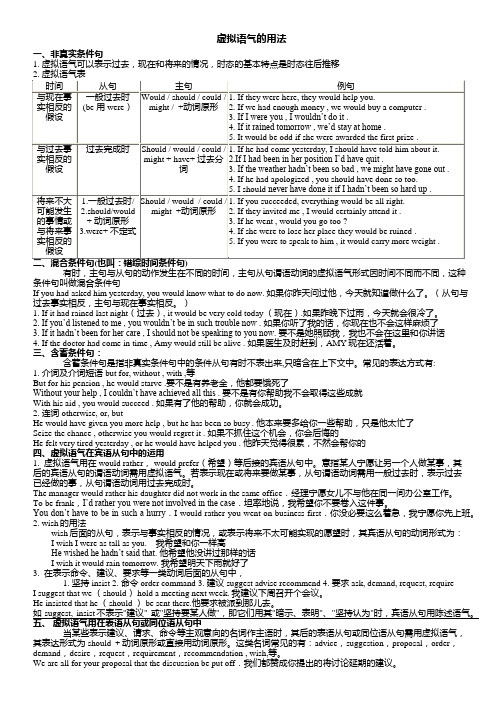
虚拟语气的用法一、非真实条件句1. 虚拟语气可以表示过去,现在和将来的情况,时态的基本特点是时态往后推移有时,主句与从句的动作发生在不同的时间,主句从句谓语动词的虚拟语气形式因时间不同而不同,这种条件句叫做混合条件句If you had asked him yesterday, you would know what to do now. 如果你昨天问过他,今天就知道做什么了。
(从句与过去事实相反,主句与现在事实相反。
)1. If it had rained last night(过去), it would be very cold today (现在).如果昨晚下过雨,今天就会很冷了。
2. If you’d listened to me , you wouldn’t be in such trouble now . 如果你听了我的话,你现在也不会这样麻烦了3. If it hadn’t been for her care , I should not be speaking to you now. 要不是她照顾我,我也不会在这里和你讲话4. If the doctor had come in time , Amy would still be alive . 如果医生及时赶到,AMY现在还活着。
三、含蓄条件句:含蓄条件句是指非真实条件句中的条件从句有时不表出来,只暗含在上下文中。
常见的表达方式有:1. 介词及介词短语 but for, without , with ,等But for his pension , he would starve .要不是有养老金,他都要饿死了Without your help , I couldn’t have achieved all this . 要不是有你帮助我不会取得这些成就With his aid , you would succeed . 如果有了他的帮助,你就会成功。
虚拟语气特殊句型
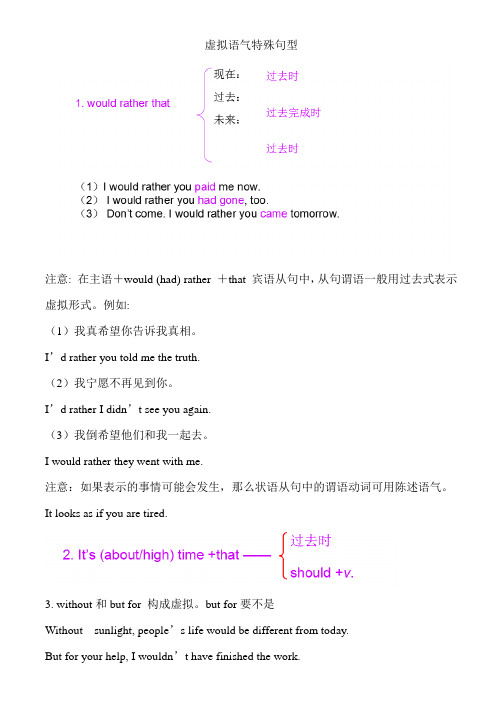
(2) = as long as常用陈述语气.
We can surely overcome these difficulties if only we are closely united.如果我们紧密团结就一定能战胜一切困难。
5.It’s necessary /strange/ natural/ important + that-Clause从句中的动词要用虚拟,即(should)+动词原形
(暗含条件是butfor your help)
(4)This same thing, happening in wartime, would lead to a disaster.
(条件暗含在分词短语happening in wartime中)
(5)He must have the strength of a hippopotamus, or he never could have vanquished that great beast.
(2)我宁愿不再见到你。
I’d rather I didn’t see you again.
(3)我倒希望他们和我一起去。
I would rather they went with me.
注意:如果表示的事情可能会发生,那么状语从句中的谓语动词可用陈述语气。
It looks as if you are tired.
含蓄条件句非真实条件句中的条件从句有时不表现出来只暗含在上下文中这种句子叫做含蓄条件句
虚拟语气特殊句型
注意:在主语+would (had) rather+that宾语从句中,从句谓语一般用过去式表示虚拟形式。例如:
(1)我真希望你告诉我真相。
虚拟语气讲解版
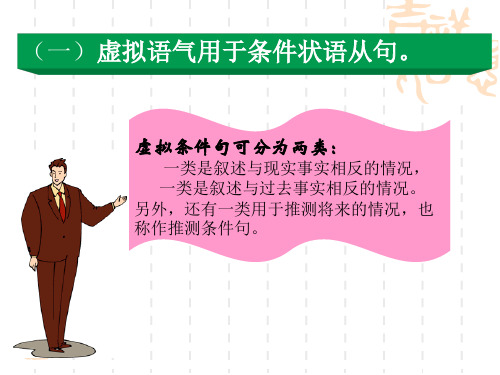
2. 虚拟语气用于 if only引导的感叹句中
If only 引导的是省略了表示结果的主句的虚拟 语气结构,现已成为惯用法,表达愿望一种不真实的 条件,译成“要是……就好了!” 从句用过去时表示现在没有实现的愿望, 对过去没有实现的或不能实现的愿望,从句就用过去 完成时。
If only I had taken his advice.我要是听他的话就好 了.
等.
I wish it were spring all the year round.
I wish you could go with us.
We wish we had arrived there two hours earlier.
2. would/had rather
would sooner/prefer+object clause 在虚拟语气中的用法表 示希望或婉转的责备。
E.g. 1.I intended I should call on you , but I was busy at that time. 2.I am sorry ,but I really didn’t mean to hurt. 3.I had planned to travel to Canada, but I had something more important to cope with.
I didn’t hear the phone, I must have been sleeping..
五)虚拟语气用于主语从句.
在主语从句中,谓语动词的虚拟语气结构用“ should 十动词原形”的结构,表示惊奇、不相信、惋惜、理应 如此等. 句型:It is /was+ 形容词/过去分词/名词 + that ……
虚拟语气讲义(15个句式)

虚拟语气讲义1.虚拟语气句型1If + were/ did/ (动词的过去式), 主语+would/ might/ should / could + do 。
(表示对现在的假设)eg. If I were you, I would not be so proud . 如果我是你,我不会如此自负.eg. I don’t have a cellphone. If I had one , it would be convenient for me to get in touch with others 我没有手机,如果我有手机的话,和别人联系就方便的多了。
eg. If I were in your position, I would think better of it .如果我处在你现在的境地,我会重新考虑然后放弃。
2. 虚拟语气句型2If + had done, 主语+would/ might/ should / could + have done表示对过去或已经发生事情的虚拟假设。
eg. What a pity it is that you didn’t attended the concert yesterday! If you had attended the concert, you would have seen the famous singer.真遗憾你昨天没有去听音乐会。
如果你去了,你就会见到那位名歌手。
eg. Anyone in his position would have done the same= If anyone had been in his position, he would have done the same.3. 虚拟语气句型3If + were/ did(动词过去式)/should/ were to do , 主语+would/ might/ should / could + do (表示对将来的假设).eg. If he should refuse (= if he were to refuse = if he refused ), it wouldn’t matter万一他拒绝了. 那也没有什么关系.eg. If you shouldn’t pass the college entrance e*amination, what would you do"万一你高考不中,你该怎么办?4. 虚拟语气条件句的倒装在虚拟条件句中,如果出现有were, had, should,可省去if,可将主语与这些词倒装,构成虚拟倒装句。
英文虚拟语气句型

英文虚拟语气句型英文虚拟语气句型有多种,以下是一些常见的例子:1.与现在事实相反:If we had time now, we would re ad the book. 如果我们现在有时间,我们会读这本书。
2.与过去事实相反:If I had known your telephone nu mber then, I would have called you. 如果我那时知道你的电话号码,我就会打电话给你。
3.与将来事实相反:If it were to rain tomorrow, the m eeting would be postponed. 如果明天下雨,会议就会推迟。
4.表示建议、愿望、惊讶等:If only I could fly! 我真希望我能飞啊!5.虚拟条件句的倒装:Had we made enough preparatio ns, we would have succeeded. 如果我们做了充分的准备,我们就会成功的。
6.含蓄虚拟条件句:Without your help, we would not have achieved the success. 如果没有你的帮助,我们不会取得这个成功。
7.并列虚拟语气句:He would go to the park if he had time, but he hasn’t. 他如果有时间会去公园,但是他没有时间。
8.宾语从句中使用虚拟语气:I wish I could fly to the moon one day. 我希望有一天我能飞到月球上去。
9.省略if的虚拟语气句型:Were he here now, he wou ld agree with us. 如果他现在在这儿,他会同意我们的意见。
10.had it not been for表示“如果不是”:Had it not b een for the rain, we would have had a pleasant journey. 如果不是因为下雨,我们的旅程会很愉快。
写作如何使用虚拟语气

写作如何使用虚拟语气虚拟语气是英语中一种特殊的语法现象,用于表达与事实相反、与现实不符合或者虚拟的情况。
在写作中,使用虚拟语气可以增加句子的变化和表达的层次,使文章更加丰富有趣。
本文将详细探讨写作中如何正确使用虚拟语气。
一、虚拟条件句虚拟条件句常用于表达假设、愿望、建议等情况。
其基本句型为:如果+主语+动词的过去式,主语+would/could/should/might/oughtto+动词原形。
例如:- If I were rich, I would travel around the world.(如果我有钱,我会环游世界。
)- If he had studied harder, he could have passed the exam.(如果他学得更努力,他本可以通过考试的。
)注意,在虚拟条件句中,虚拟的动作或情况与现实相反或不可能实现,因此要使用过去式或过去完成时来表示。
二、虚拟表达愿望虚拟语气也常用于表达对现实情况的不满、愿望或建议。
常用的句型包括:- I wish/If only+主语+过去式(与现在事实相反)- I wish/If only+主语+had+过去分词(与过去事实相反)- I would rather+主语+过去式/过去完成时+(that)从句(表示偏好)例如:- I wish I had a car.(我希望我有一辆车。
)- If only I were taller.(要是我个子再高点该多好。
)- I would rather you came tomorrow.(我宁愿你明天来。
)注意,在虚拟表达愿望时,要根据具体情况选择使用过去式、过去完成时或模态动词。
三、虚拟表达建议虚拟语气还可用于表达建议、要求或命令。
常用的句型包括:- It is suggested/recommended/important/vital+that+主语+动词原形- It is demanded/required/necessary+that+主语+动词原形例如:- It is suggested that he take a break.(建议他休息一下。
高中英语破题致胜微方法(虚拟语气)虚拟语气之含蓄条件句
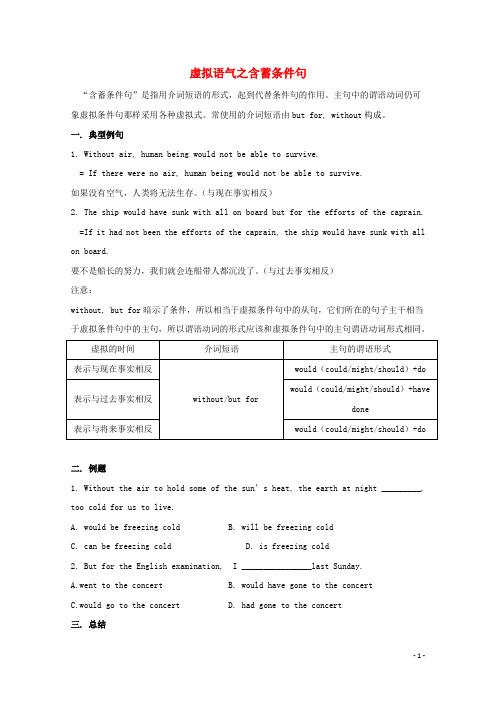
虚拟语气之含蓄条件句“含蓄条件句”是指用介词短语的形式,起到代替条件句的作用。
主句中的谓语动词仍可象虚拟条件句那样采用各种虚拟式。
常使用的介词短语由but for, without构成。
一. 典型例句1. Without air, human being would not be able to survive.= If there were no air, human being would not be able to survive.如果没有空气,人类将无法生存。
(与现在事实相反)2. The ship would have sunk with all on board but for the efforts of the caprain. =If it had not been the efforts of the caprain, the ship would have sunk with all on board.要不是船长的努力,我们就会连船带人都沉没了。
(与过去事实相反)注意:without, but for暗示了条件,所以相当于虚拟条件句中的从句,它们所在的句子主干相当于虚拟条件句中的主句,所以谓语动词的形式应该和虚拟条件句中的主句谓语动词形式相同。
二. 例题1. Without the air to hold some of the sun’s heat, the earth at night _________, too cold for us to live.A. would be freezing coldB. will be freezing coldC. can be freezing coldD. is freezing cold2. But for the English examination, I ________________last Sunday.A.went to the concertB. would have gone to the concertC.would go to the concertD. had gone to the concert三. 总结含蓄条件句解题策略:1. but for,without= if...,后接虚拟语气2. but for,without所在句子的主干相当于虚拟条件句中的主句。
虚拟语气
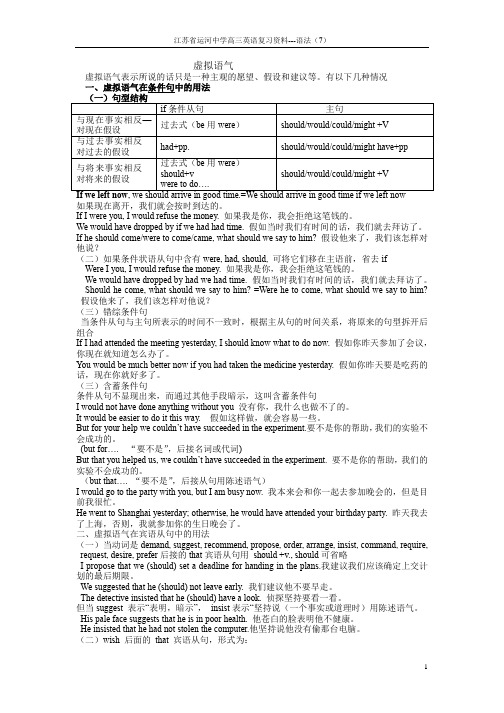
虚拟语气虚拟语气表示所说的话只是一种主观的愿望、假设和建议等。
有以下几种情况一、虚拟语气在条件句中的用法如果现在离开,我们就会按时到达的。
If I were you, I would refuse the money.如果我是你,我会拒绝这笔钱的。
We would have dropped by if we had had time.假如当时我们有时间的话,我们就去拜访了。
If he should come/were to come/came, what should we say to him?假设他来了,我们该怎样对他说?(二)如果条件状语从句中含有were, had, should, 可将它们移在主语前,省去ifWere I you, I would refuse the money.如果我是你,我会拒绝这笔钱的。
We would have dropped by had we had time.假如当时我们有时间的话,我们就去拜访了。
Should he come, what should we say to him?=Were he to come, what should we say to him?假设他来了,我们该怎样对他说?(三)错综条件句当条件从句与主句所表示的时间不一致时,根据主从句的时间关系,将原来的句型拆开后组合If I had attended the meeting yesterday, I should know what to do now.假如你昨天参加了会议,你现在就知道怎么办了。
You would be much better now if you had taken the medicine yesterday.假如你昨天要是吃药的话,现在你就好多了。
(三)含蓄条件句条件从句不显现出来,而通过其他手段暗示,这叫含蓄条件句I would not have done anything without you没有你,我什么也做不了的。
虚拟语气的用法与常见句型
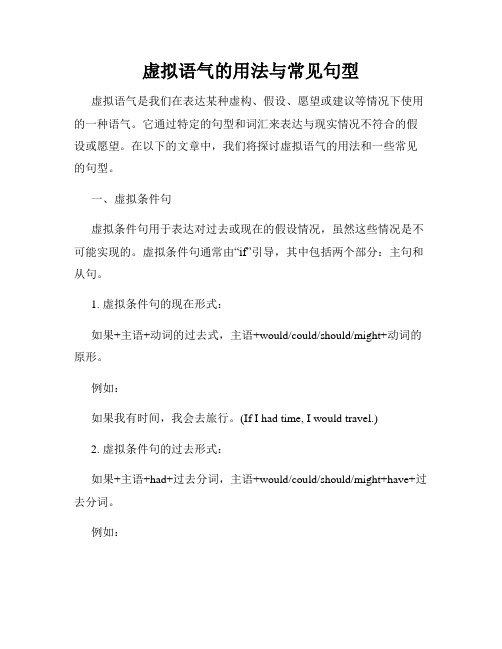
虚拟语气的用法与常见句型虚拟语气是我们在表达某种虚构、假设、愿望或建议等情况下使用的一种语气。
它通过特定的句型和词汇来表达与现实情况不符合的假设或愿望。
在以下的文章中,我们将探讨虚拟语气的用法和一些常见的句型。
一、虚拟条件句虚拟条件句用于表达对过去或现在的假设情况,虽然这些情况是不可能实现的。
虚拟条件句通常由“if”引导,其中包括两个部分:主句和从句。
1. 虚拟条件句的现在形式:如果+主语+动词的过去式,主语+would/could/should/might+动词的原形。
例如:如果我有时间,我会去旅行。
(If I had time, I would travel.)2. 虚拟条件句的过去形式:如果+主语+had+过去分词,主语+would/could/should/might+have+过去分词。
例如:如果我昨天去了那个聚会,我会见到他的。
(If I had gone to the party yesterday, I would have met him.)二、虚拟语气的用途虚拟语气除了用于条件句之外,还可用于表达愿望、建议、命令、让步等情况。
下面是一些常见的虚拟语气句型。
1. 愿望:(a) 现在的愿望:I wish (that) + 主语 + 过去式例如:I wish I were taller. (我希望我更高。
)(b) 过去的愿望:I wished (that) + 主语 + 过去完成时例如:I wished I had studied harder for the exam. (我希望我在考试前更努力学习。
)2. 建议:It is suggested (that) + 主语 + (should) + 动词原形例如:It is suggested that he (should) go on a vacation. (有人建议他去度假。
)3. 命令:It is important/necessary/vital + that + 主语 + (should) + 动词原形例如:It is important that you (should) arrive on time. (重要的是你按时到达。
[实用参考]含蓄虚拟条件句
![[实用参考]含蓄虚拟条件句](https://img.taocdn.com/s3/m/dc8701ac71fe910ef02df81b.png)
(4) 将条件隐含在名词短语中。如:
▪ A true friend would not have betrayed me. 若是真正的朋友,就不会背弃我。
(=If he had been a true friend, he would…) ▪ A few hours earlier, and you would have seen the famous writer. 要是你早来几个小时,你就见到这位著名的 作家了。
含蓄虚拟条件句
用法归纳
定义:
▪ 提到条件句,人们一般会想到if引导 的条件句,而英语中某些假设的条件 句不是通过if从句表达出来,而是包 含在某些短语、上下文或其他方式中, 其谓语也常用虚拟语气,我们称此种 结构为含蓄条件句。
(1) 将条件隐含在不定式短语中。如:
▪ I should be happy to go with you. 如果能与你一起去,我将很高兴。
(2) 将条件隐含在分词短语中。如:
▪ Born in better times, he would have been a scholar. 如果出生在好时代,他早就成为学者了。 (=If he had been born in better times, he …)
▪ Failing this time, what would you do? 假若这次失败,那你怎么办?
课文原句:
1. …restricting smoking in public places “would set up two classes of citizens and would make many people angry.”
= If smoking were restricted in public places, it would set up two classes of citizens and make many people angry.
虚拟语气的表示与条件句

虚拟语气的表示与条件句虚拟语气是英语中的一种语法形式,用来表达假设、愿望、建议、要求等非现实情况。
它在条件句中使用广泛,通过虚拟语气的运用,我们可以表达对于某种条件的猜测、假设或者虚构的情境。
本文将详细探讨虚拟语气在条件句中的功能与表示方法。
一、虚拟语气的基本用法虚拟语气在条件句中表示一种假设或者与事实相反的情况。
在英语中,虚拟语气主要有以下几种形式:1. 虚拟条件句虚拟条件句用于表示与现实相反或者未实现的情况。
一般由"if"引导,主句使用"would"或者“should”来表示结果。
例如:If I were rich, I would travel around the world.(如果我有钱,我会周游世界。
)2. 虚拟假设句虚拟假设句用于表示对现在或者过去的假设。
一般由"if"引导,主句使用"could"或者"might"来表示可能性。
例如:If I had studied harder, I might have passed the exam.(如果我学习更努力,我可能会通过考试。
)3. 虚拟愿望句虚拟愿望句用于表示对未来或者现在的愿望,常常以"if only"引导。
例如:If only I could speak fluent French!(要是我能流利地说法语就好了!)二、虚拟语气与情态动词的使用在条件句中,虚拟语气与情态动词的使用密切相关。
情态动词在表示虚拟语气时,具有特殊的用法。
1. would在虚拟条件句中,主句通常使用"would"来表示结果。
例如:If it rained tomorrow, I would stay at home.(如果明天下雨,我会呆在家里。
)2. could / might / should这些情态动词在虚拟假设句中表示可能性。
- 1、下载文档前请自行甄别文档内容的完整性,平台不提供额外的编辑、内容补充、找答案等附加服务。
- 2、"仅部分预览"的文档,不可在线预览部分如存在完整性等问题,可反馈申请退款(可完整预览的文档不适用该条件!)。
- 3、如文档侵犯您的权益,请联系客服反馈,我们会尽快为您处理(人工客服工作时间:9:00-18:30)。
If we had your support, we might succeed in performing our task.
= With your support, we might succeed in performing our task.
要是有了你的帮助,我们就会成功地完成任务。
要是没有党的领导,今天我们就不会过上幸福的生活。
If it had not been for your help, we would not have achieved so much in our work.
要不是你的帮助,我们就不会在工作中取得这么多成绩。
2. 含蓄条件句可以看成是条件句的简略形式。
句型说明:
1. “If it (be) not for …” 是常见的虚拟条件句的句型,意思是“要不是ห้องสมุดไป่ตู้”,相当于but for和without。
If it were not for the leadership of the party, we could not be living a happy life today.
Even if there were air and water, plants still couldn’t grow on the moon.
= Even with air and water, plants still couldn’t grow on the moon.
即使有了空气和水,植物也仍然不能在月球上生长。
